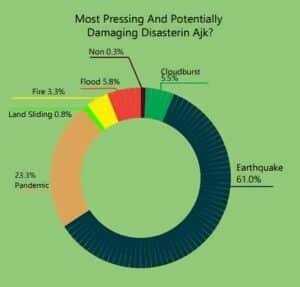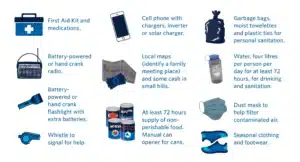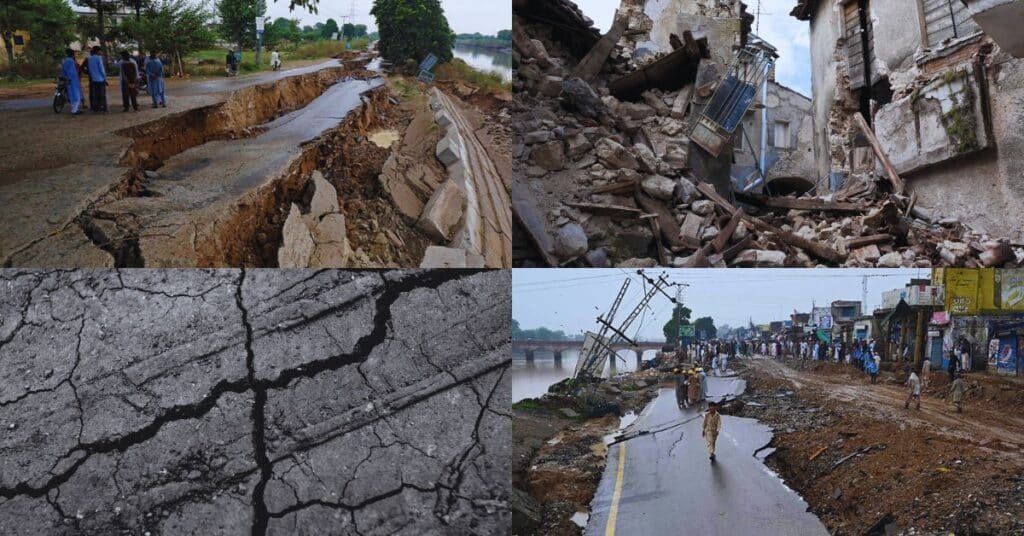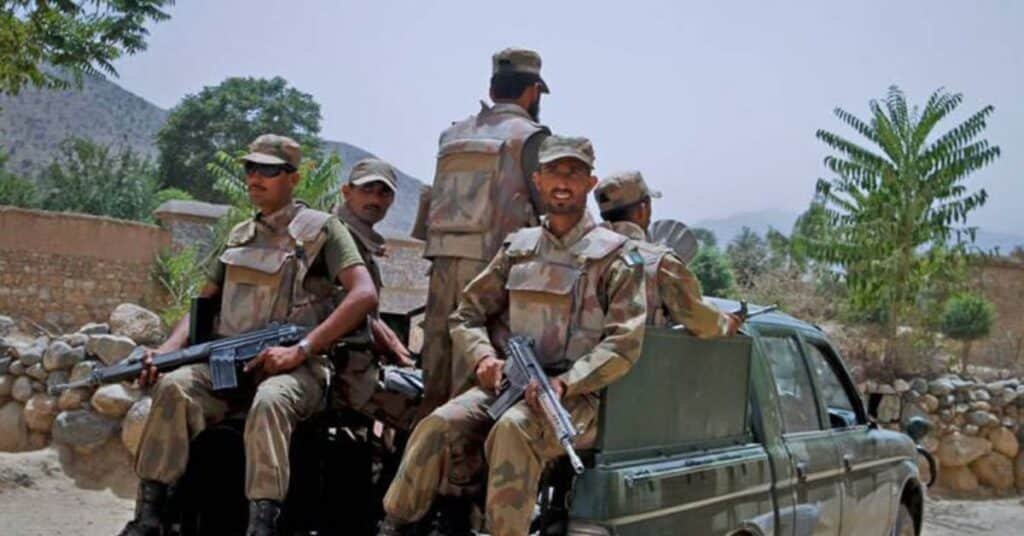MUZAFARABAD (Kashmir English): Earthquake preparedness is necessary. If you live in Azad Jammu and Kashmir (AJK), you’re no stranger to the occasional tremor. Since there have been many earthquakes in recent days in Pakistan and Azad Kashmir, it’s a stark reminder that our territory is prone to seismic activity. With the magnificent colossal mountains and spectacular valleys come the geological realities of being in an earthquake zone.
In response to the recent surge of earthquakes in Pakistan and Azad Jammu and Kashmir (AJK), it’s imperative to understand the necessary precautions to ensure safety before, during, and after such events.
Kashmir Institute of International Relations (KIIR) conducted research intending to understand the state of disaster management across Azad Jammu Kashmir. According to that study overall, 61 per cent of respondents have identified earthquakes as the major risk in terms of natural disasters for AJK and one that takes precedence over others.

But not to worry, being prepared can make much contrast. Let’s go through some practical, life-saving steps you can take before, during, and after an earthquake.
Before an earthquake: Be prepared, not scared
A little preparation goes a long way, and in a place like AJK, where earthquakes can strike anytime, it’s crucial to stay prepared.
Secure Your House
Anchor-heavy furniture like bookshelves, cupboards, and mirrors should be attached to the walls. Also storing heavy objects on lower shelves reduces the risk of them falling on you during a high-magnitude earthquake. Check your house structure, if you live in an older home, consider getting it inspected for earthquake resilience.
Have an Emergency Kit Ready
A basic survival kit should include: Water (at least three days’ supply per person), non-perishable foodstuffs, a first aid kit, a flashlight and extra batteries, a whistle to signal for help, copies of important documents (CNIC, property papers, etc.), warm clothes and blankets as winters in AJK can be harsh.

Plan an escape route before any hazard
Recognize safe open spaces away from buildings, trees, and power lines and make sure your family knows the nearest safe spot.
You may also want to practise ‘Drop, Cover, and Hold On’ drills with your family, especially kids.
During an earthquake stay calm and act wisely
When the earth starts shaking, panic is your worst foe. Here’s what you should do:
If you are indoors drop, cover, and hold on: Drop to your hands and knees, cover your head and neck under a sturdy table, and hold on until the shaking stops, just like we were taught in school emergency drills.
Stay away from windows, mirrors, and glass as these can shatter and cause serious injuries.
Also, avoid doorways, unlike popular belief, standing in a doorway isn’t safe. The safest spot is under sturdy furniture. If you are in bed, stay there and cover your head with a pillow till the first tremor is over, then evacuate.

If you are outdoors you should move to an open area, away from buildings, trees, and power lines. If you are in Muzaffarabad, Mirpur, or any crowded area, stay alert to avoid stampedes.
If you are driving pull over safely and stay inside your vehicle until the shaking stops. Avoid stopping under bridges, flyovers, or near power lines as there is an unfortunate chance for them to crumble or collapse.
After an Earthquake stay safe and help others in need
The immediate aftermath of an earthquake is crucial. Aftershocks are expected, so don’t suppose the danger is gone. Earthquake preparedness doesn’t only include the actions you take, but the knowledge you possess too.
Check yourself and others for injuries
Administer first aid if necessary. If someone is trapped under rubble, do not move them unless they are in direct danger. Rather, call for help. As a part of earthquake preparedness, it is important to not drag and pull victims from under the rubble, as it may damage their spines and cause life-long injuries.
Instead, it is suggested to remove the debris and rubble first with the help of others.
Beware of Aftershocks
Aftershocks can be just as strong as the first quake. Stay in a safe place and do not panic. If you are indoors, go out carefully once the shaking stops.
Check for Hazards
Do you smell gas leaks? If yes, turn it off and leave the building. If one fails to do that the chances of a fire breaking out get high. Avoid stepping on electric wires and avoid re-entering until authorities say they are safe.
Stay updated and follow local authorities and emergency response teams. Phone networks may be jammed, so use SMS or social media to check-in. If the power is off, save your phone battery.
![]()
In AJK, many live in mountainous regions, which adds additional challenges making earthquake preparedness necessary. Landslides can occur after earthquakes, especially if heavy rainfall has softened the soil, or if it has been snowing avalanches can occur. If you live near a slope, be careful and remain alert for any unusual cracks or ground movement.
Moreover, in cities like Muzaffarabad and Mirpur, where facilities are closely packed, the risk of collapsing structures is greater.
Earthquakes are unanticipated, but our reaction to them doesn’t have to be. By organising in advance, remaining calm during the shaking, and acting wisely later, we can rescue ourselves and our loved ones.




